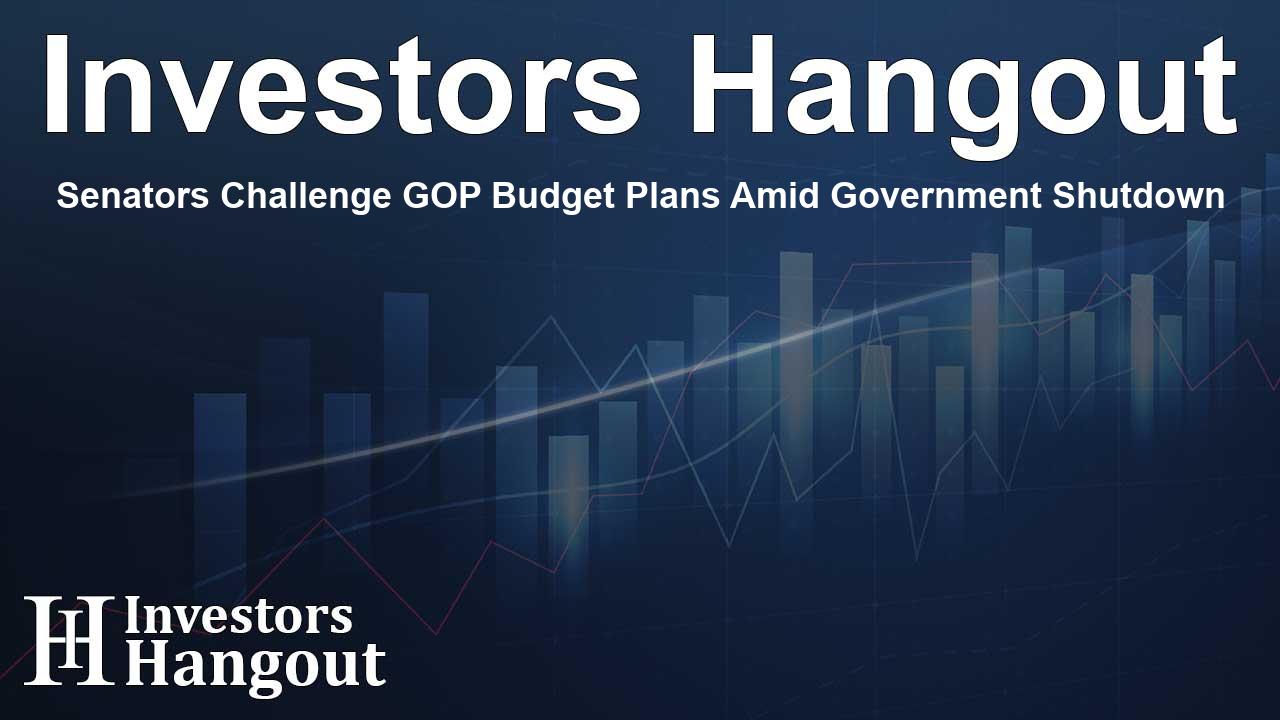Senators Challenge GOP Budget Plans Amid Government Shutdown

Senators Sound Off on Healthcare Concerns During Shutdown
On a significant day marked by the U.S. government shutdown, Senators Bernie Sanders and Alexandria Ocasio-Cortez came together through a compelling video message to alert Americans about the Republican Party's controversial healthcare plan. Their message was clear: they will not stand aside while such tactics threaten the lives and well-being of millions.
Alerting Americans About Premium Increases
In their shared video on various social media channels, Sanders addressed the criticism directed at both himself and Ocasio-Cortez regarding their refusal to endorse what Republicans labeled a 'clean' continuing resolution. He emphasized that the language used to describe the bill was misleading and called for transparency.
In response, Ocasio-Cortez insisted that the proposed budget isn't clean at all. She expressed deep concern that millions of Americans could soon face a doubling of their monthly insurance premiums. “This is one of the dirtiest tricks being pulled on the American populace right now,” she asserted.
Ocasio-Cortez elaborated on the dire ramifications of potential premium hikes, noting that many might find critical medical treatments—like chemotherapy or insulin—prohibitively expensive. She stressed the gravity of the situation, emphasizing the significant impact on public health.
Harsh Realities Beyond Rising Costs
Sanders amplified the urgency by discussing the broader consequences tied to these increased costs. He cited research conducted by prestigious institutions such as Yale and the University of Pennsylvania, warning that doubling the premiums for the Affordable Care Act (ACA) while simultaneously removing 15 million individuals from Medicaid could contribute to thousands of preventable deaths.
“Every year, working-class Americans will face dire consequences,” Sanders stated passionately. His words remind us of the stark reality that financial burdens can have catastrophic health implications.
Government Shutdown's Impact on Services
The government entered a shutdown phase at 12:01 a.m., following the Senate's failure to pass any of the proposed funding bills put forth by both political parties. Each effort to secure the required 60 votes fell short, leaving many government services in jeopardy.
Amid the turmoil, the proposed Democratic plan aimed to restore $1 trillion in Medicaid funding cuts and extend essential Obamacare subsidies. Unfortunately, this bid was denied, with the vote concluding at 47-53 along party lines.
Meanwhile, the House Republicans managed to pass a temporary funding bill that would maintain government operations until mid-November. However, the Senate had previously stalled this measure, leaving crucial negotiations ahead.
Hundreds of thousands of federal employees now face the uncertainty of furloughs or delays in compensation, underscoring the human cost of political disagreements. Essential services like border security and air traffic control remain operational, but that does little to alleviate the anxiety experienced by those affected.
Commitment to Resist Budget Cuts
Ocasio-Cortez criticized her Republican colleagues, asserting they wanted Democrats to pass a budget that would jeopardize families nationwide. Her sentiments were echoed by Sanders, who pointed out that the U.S. stands out as the only major nation without universal healthcare provisions.
“We’re not going to let that happen,” Sanders confidently declared, asserting a commitment to protecting health and welfare against profit-driven motives.
Public Response and Political Consequences
Public opinion polls indicate Republicans may bear the brunt of the blame for the ongoing shutdown. A recent survey revealed that a significant 45% of voters hold Republicans accountable compared to 32% who attribute fault to Democrats.
Economic commentators acknowledge minimal immediate impact from the shutdown on the economy, yet they describe it as a costly political episode. Observers express worry that this event might escalate due to potential mass layoffs triggered by political miscalculations.
In this challenging climate, both Sanders and Ocasio-Cortez remain steadfast in their resolve to advocate for fair healthcare policy and a government that prioritizes its citizens' health above political gains.
Frequently Asked Questions
What prompted Sanders and Ocasio-Cortez to speak out?
They are concerned about proposed Republican healthcare plans and their potential impact during the government shutdown.
How might insurance premiums be affected?
There’s a risk that premiums could double for millions, leading to unaffordable treatments for many.
What are the consequences of the government shutdown?
It may result in furloughs for federal workers and disruptions to services, while negotiations for funding continue.
What is the Democrats’ stance regarding the budget plan?
Democrats oppose cuts that would harm families, focusing on maintaining healthcare coverage for Americans.
How does public opinion view the shutdown?
Polls suggest a majority blame Republicans more than Democrats for the shutdown, indicating potential political fallout.
About The Author
Contact Riley Hayes privately here. Or send an email with ATTN: Riley Hayes as the subject to contact@investorshangout.com.
About Investors Hangout
Investors Hangout is a leading online stock forum for financial discussion and learning, offering a wide range of free tools and resources. It draws in traders of all levels, who exchange market knowledge, investigate trading tactics, and keep an eye on industry developments in real time. Featuring financial articles, stock message boards, quotes, charts, company profiles, and live news updates. Through cooperative learning and a wealth of informational resources, it helps users from novices creating their first portfolios to experts honing their techniques. Join Investors Hangout today: https://investorshangout.com/
The content of this article is based on factual, publicly available information and does not represent legal, financial, or investment advice. Investors Hangout does not offer financial advice, and the author is not a licensed financial advisor. Consult a qualified advisor before making any financial or investment decisions based on this article. This article should not be considered advice to purchase, sell, or hold any securities or other investments. If any of the material provided here is inaccurate, please contact us for corrections.
